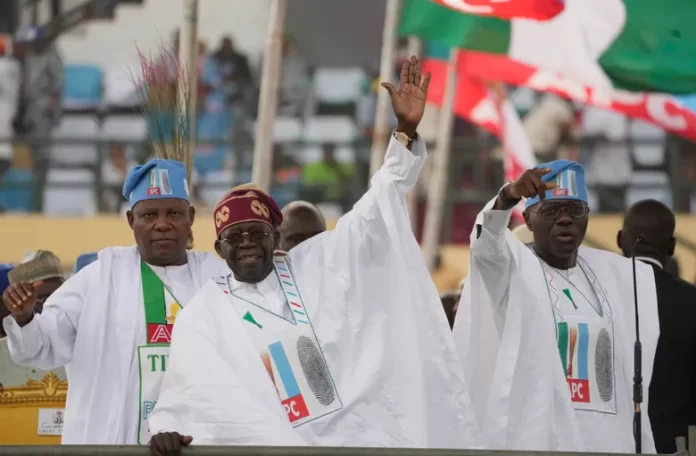On Monday, a Nigerian court started considering several lawsuits that the opposition had filed to contest the incumbent party’s victory in the nation’s presidential election.
Bola Tinubu of the ruling All Progressives Congress won the February election, and the results are being challenged by opposition parties. The presidential tribunal at the Court of Appeal in the nation’s capital, Abuja, heard their opening comments.
Armed security guards barred the facility’s main entrances as the court session got underway and stopped a few media and solicitors from entering. Several demonstrators brandished Nigerian flags and held up signs as they alleged voting fraud.
James Mike, a protester, stated: “The reason I’m here is out of the anger and pain I feel as a Nigerian that I’m not allowed to express and enjoy the resources of the land.” Mike also accused the Nigerian political class of stealing the nation’s wealth from its enormous mineral and crude oil reserves.
Tinubu received 37% of the vote, and the Nigerian election commission announced his victory in a televised broadcast.
The two leading opposition candidates, however, challenged the outcome, disputing Tinubu’s eligibility and asserting that the results from the 177,000 polling places around the nation had been tampered with.
Analysts and observers said that the voting on Feb. 25 was largely an improvement from Nigeria’s previous elections, but said that delays in uploading results might have given room for the figures to be tampered with.
In separate petitions, both second-place finisher Atiku Abubakar of the Peoples Democratic Party and No. 3 finisher Peter Obi of the Labour Party argued that Nigeria’s electoral commission violated the provisions of the law in announcing the results of the election.
Obi has said he has evidence to show he tallied the majority votes in the election while Abubakar has asked the court to disqualify Tinubu, alleging that he has a Guinean passport and therefore wasn’t eligible to enter the presidential contest under the Nigerian Constitution.
“We are telling the court that he (Tinubu) is not qualified and contrary to the law, he did not put (the election commission) on notice that he has citizenship of another country,” said Paul Ibe, a spokesman for Abubakar.
In Nigeria, an election can be invalidated only if it’s proven that the national electoral body largely didn’t follow the law and acted in ways that could have changed the result. None of Nigeria’s presidential election results has ever been overturned by the country’s Supreme Court, though analysts said this year’s vote is peculiar with the heavy deployment of technology in the electoral process.
The main opposition party has said without evidence that the ruling party is plotting to interfere with the court process, adding to tensions as the country awaits the judgment of the court while preparing for the inauguration of Tinubu as president.
The court challenge though is usually a lengthy process and is expected to last for months, beyond May 29 when Tinubu is due to take over from incumbent President Muhammadu Buhari.


